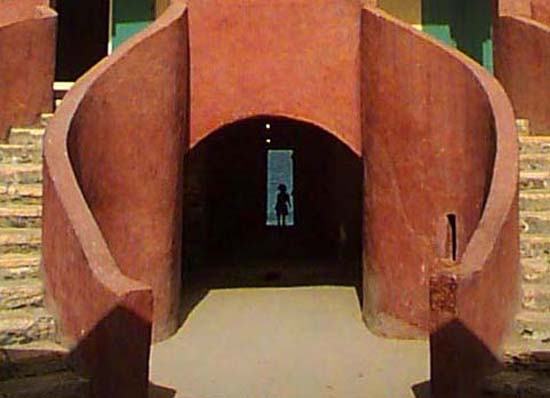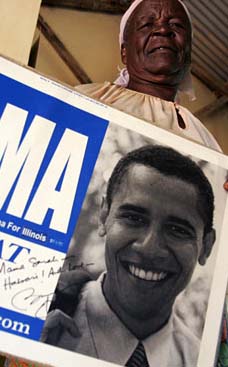
“I am assigned to the village of Laboya in the Tambacounda — commonly called Tamba — region of Senegal,” Semmes said. “Tamba is about 500 kilometers from Dakar, but it is an eight- to 12-hour drive down a two-lane, severely potholed road, with the time variance depending mainly on how many times the car breaks down (I’d say three minor breakdowns per trip has been about average for me). "My village is another 70 kilometers down the road from Tambacounda the city, capital of Tambacounda region... A national park (Niokolo Koba) was created just to the south of where I live shortly after Senegal became independent. All the people living in the park at that time had to move, and most of them moved to just outside the new park boundaries. So most of the villages in my immediate area, including mine, were established when people were displaced by the creation of the park. My village’s name means ‘The Woodcutter’s Place,’ after its first inhabitant, and it was originally settled by the Jaxanke ethnic group (which is the primary language I have learned to speak), but sometime in the 1980s a banana plantation was established which attracts workers from all over West Africa (Mali, Guinea, Guinea-Bissau, Mauritania), so now my village is quite multi-ethnic, but Pulaar is the majority ethnic group.”
Rebecca Semmes leaves comforts of U.S. to serve Peace Corps in Senegal
Local woman leaves comforts of U.S. to serve Peace Corps in Senegal
Elizabeth Ayres
Herald-Citizen Staff
Sunday, Dec 07, 2008
Editor’s Note: This is Part One of a two-part series of Rebecca Semmes’ experiences as she is currently abroad serving the Peace Corps in Senegal.
TAMBACOUNDA REGION, Senegal — Rebecca Semmes is a 26-year-old woman who, like many others her age, got restless when she neared her college graduation. She even prolonged her college experience with a master’s degree, but when it was time to go out into the “real world” and get a real job, she still had an itch to do something different. That’s when the Peace Corps officially entered her world, and the organization has her halfway across the globe in the Senegal.
“I’ve always liked to travel and experience other cultures, so I’ve wanted to join Peace Corps ever since I first heard about it when I was a freshman in college,” Semmes said. “But by the end of college I guess I’d gotten kind of cynical, having heard stories about how ineffective Peace Corps is at poverty reduction. So when I finished college, I went to grad school instead for a master’s in international relations, and then after grad school I wanted to get a ‘real job’ with a paycheck, so I worked for two years in Washington, D.C. at a non-governmental organization (NGO), working on issues related to refugees and humanitarian assistance.
“But after awhile I got antsy and wanted to go abroad again — I’ve done study abroad and internships in Spain, France and Switzerland, but never traveled outside Western Europe. Peace Corps really appealed to me because they teach you a local language, and you get to live in a village and be a part of the community, which is a level of integration that I don’t think any other job offers. And I guess I got less cynical about Peace Corps again, or maybe just realistic, so the thought of spending two years working in a village and ultimately not a whole lot changing there didn’t bother me anymore. Or maybe it was that my motivation was different — mostly I was interested in it as a learning experience for myself, which would hopefully then help me in a future career working in humanitarian assistance and with refugees. And, of course, if my work in Peace Corps actually had an impact and helped my villagers, then so much the better.
“I was 25 when I joined Peace Corps, a little older than the average since most volunteers are only a year or two out of college, and I’ll be 27 when I’m done.”
As Semmes stated before, the Peace Corps, which was created from an idea by then-Sen. John F. Kennedy in 1960 when he challenged a group of University of Michigan students to serve the world and harbor peace by living in and contributing to developing countries, educates participants in their new surroundings and sends them to serve other nations for a two-year time period. Since the Peace Corps was created, more than 190,000 volunteers have served in 139 host countries to work on issues such as AIDS education, environmental preservation and the furtherance of education.
“I am assigned to the village of Laboya in the Tambacounda — commonly called Tamba — region of Senegal,” Semmes said. “Tamba is about 500 kilometers from Dakar, but it is an eight- to 12-hour drive down a two-lane, severely potholed road, with the time variance depending mainly on how many times the car breaks down (I’d say three minor breakdowns per trip has been about average for me).
“My village is another 70 kilometers down the road from Tambacounda the city, capital of Tambacounda region... A national park (Niokolo Koba) was created just to the south of where I live shortly after Senegal became independent. All the people living in the park at that time had to move, and most of them moved to just outside the new park boundaries. So most of the villages in my immediate area, including mine, were established when people were displaced by the creation of the park. My village’s name means ‘The Woodcutter’s Place,’ after its first inhabitant, and it was originally settled by the Jaxanke ethnic group (which is the primary language I have learned to speak), but sometime in the 1980s a banana plantation was established which attracts workers from all over West Africa (Mali, Guinea, Guinea-Bissau, Mauritania), so now my village is quite multi-ethnic, but Pulaar is the majority ethnic group.”
Many Peace Corps participants have the option to choose the region where they’d like to live. Rebecca Semmes aimed to improve her French, and she has said that her new African home has helped her achieve her goal. Many volunteers use their prior education to line up a job assignment, but Semmes is working on something that is so fundamental to Americans, yet so vital to those in third-world nations, as well as additional side projects.
“My primary job assignment is health education, which means teaching the villagers (and in practice it is mainly the women) basic health concepts like the importance of washing hands with soap to prevent disease transmission, especially diarrhea, and that malaria is transmitted by mosquitoes, so it is important to sleep under a mosquito net,” Semmes continued. “I also teach an English class to some of the men in my village, not because it is part of my official job, or even because I think it is likely to ever be useful for them, but just because they asked me, and I thought it would be good to encourage any interest people show in education. And it turned out to have a great side effect benefit for me: my villagers finally realized that I might actually have something to teach them, in spite of my ineptitude at cooking or washing clothes or doing anything else that they think a person with half a brain ought to be able to do, and then I started getting treated with a lot more respect in my village. I’ve also tried teaching a literacy class for some of the women, as none of the women over the age of 15 in my village has ever been to school and many of them — but definitely not all — say that they wish they could read and write. But that project hasn’t gone so well, because the women are so busy with chores, and although they want to know how to read and write, they aren’t generally motivated enough to put in the time practicing on a regular basis.
“We earn two days of vacation a month, which, over two years, adds up to 48 days, so I’ve used my vacation time to go to Guinea, Morocco and, over this Christmas, hopefully to Mali.”
What is amusing about her story is that Semmes nearly missed out on the opportunity because she was so bothered by the application process. Once having gotten approvals in the written application and the interview portions, her biggest hassle came from all the medical “hoops” she had to jump through before she was given clearance. Semmes said that she had to go through an inordinate amount of blood tests and procedures for someone who was perfectly healthy.
“After going to probably 10 doctor visits in three or four months, I just couldn’t take it anymore, and I thought Peace Corps was just not meant to be for me. So I told myself this was the last time I was going to the doctor; if it didn’t work out, then I would just come up with a new plan for something to do instead of Peace Corps. But, magically, things finally worked out and I got my medical clearance from Peace Corps, and then a few weeks later I got a letter saying that I’d been assigned to go to Senegal. And after that I just had to give notice at my job and move out of my apartment and pack up and get on the plane.”
And with already being in a foreign nation, travel abroad is that much easier for respites away from work.
“I left America to fly to Senegal on March 14, 2007. In February this year, I went on a short, much-needed vacation to Paris, where I met up with a friend from America. In May I went on a 10-day biking trip in the mountains of northern Guinea (which borders Senegal); in September, I flew to Morocco to do the typical tourist stuff there for 10 days; and I’m hoping to do one last vacation in Mali over this Christmas and New Year’s.
“We earn vacation days in Peace Corps, just like with a regular job, which we can do whatever we want with. Forty-eight days in two years might seem like a lot, but our work week is officially seven days a week, so we have to take vacation days for weekend days as well, so I think it evens out compared to the amount of vacation people get in a regular job.
“A lot of volunteers will use at least some of their vacation time to go back home for Christmas... But I wanted to use the time I have to travel in Africa, since I’m already on the continent and it’s relatively cheap to travel around, and who knows when I’ll ever have the time (or money) again,” Semmes said. “Of course I miss my family and have been homesick in general many times (always especially when I am sick), so I’ve thought about going home for vacation or even quitting Peace Corps and coming home for good. But something nice always happens to cheer me up, usually something simple like having a good day cooking lunch with my host sisters and playing with their babies, or maybe a Senegalese person will tell me how much they appreciate me and other volunteers coming here to try to help them, and then I remember how much I love it here, and I am ready to stay a little longer.”













